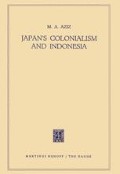Abstract
During many centuries of her existence, as a nation and as a state, Japan manifested a great interest in subjugating her adjacent territories. With the Meiji Restoration in 1868 there commenced a new chapter in the history of Japan. In a few crowded years she was transformed from a weak medieval empire into a modern powerful state. The rapid industrialisation by means of state subsidies, the improvement in agriculture, the abolition of feudalism, and the adoption of a parliamentary but autocratic constitution on the Prussian model brought about an unprecedented revolution in the economic, social and political structure of the country. The military machine — an army after the German style and a navy after the British — was quickly perfected. Once the foundations of the state had been successfully laid on the Western technical prerequisites of power, Japan proceeded to embark on a policy of expansion. The constant pressure of international power politics after the middle of the nineteenth century also compelled her “to expand in search of the foreign markets so desperately needed to realise the profits which could not be obtained from the narrow market, and in search of cheap essential raw materials which were denied her through the accident of geography.”1
Access this chapter
Tax calculation will be finalised at checkout
Purchases are for personal use only
Preview
Unable to display preview. Download preview PDF.
References
E. H. Norman, Japan’s Emergence as a Modern State (Institute of Pacific Relations, New York 1946), p. 197.
Survey of International Affairs, 1939–1946: The World in March 1939, ed. by A. J. Toynbee and F. T. Ashton-Gwatkin (Oxford Univ. Press, London 1952), p. 118.
Quoted in John W. Wheeler-Bennett, Documents on International Affairs, 1932 (Oxford Univ. Press, London 1933), p. 358.
See Yoshi S. Kuno, Japanese Expansion on the Asiatic Continent, Vol. I (Univ. of California Press, Berkeley 1937), p. 143.
Quoted in Japan’s Dream of World Empire. The Tanaka Memorial, ed. by Carl Crow (Harper & Brothers, New York 1942), pp. 12–14. Japanese texts are usually difficult to translate, as some words have a double meaning. Some authors suggest ‘Great Arbiter’ instead of ‘Great Ruler’.
Kurt London, Backgrounds of Conflict (The Macmillan Company, New York 1947), p. 212.
R. Hidemichi Akagi, Japan’s Foreign Relations 1542–1936 (The Hokuseido Press, Tokyo 1936), p. 113.
Chinese currency.
E. H. Norman, op. cit., p. 200.
Rights and permissions
Copyright information
© 1955 Martinus Nijhoff, The Hague, Holland
About this chapter
Cite this chapter
Aziz, M.A. (1955). Japan Starts Conquering Dependencies. In: Japan’s Colonialism and Indonesia. Springer, Dordrecht. https://doi.org/10.1007/978-94-011-9233-0_1
Download citation
DOI: https://doi.org/10.1007/978-94-011-9233-0_1
Publisher Name: Springer, Dordrecht
Print ISBN: 978-94-011-8500-4
Online ISBN: 978-94-011-9233-0
eBook Packages: Springer Book Archive

